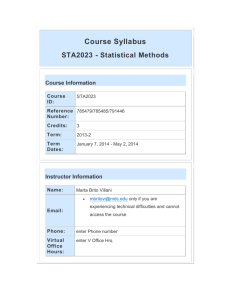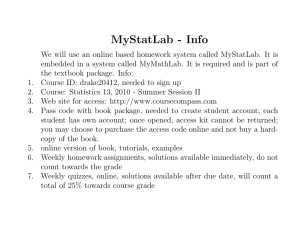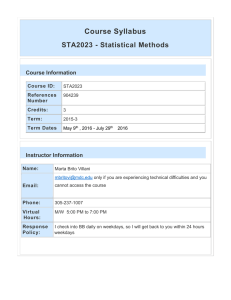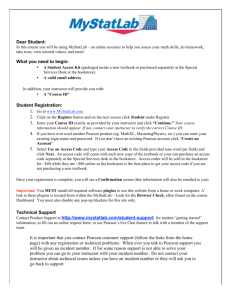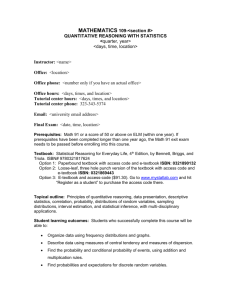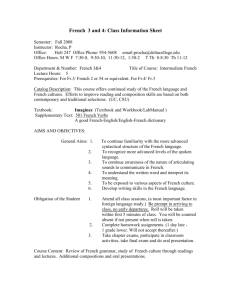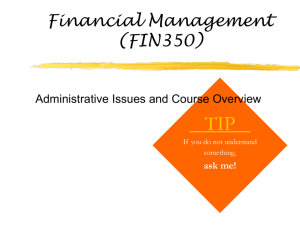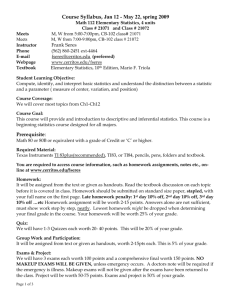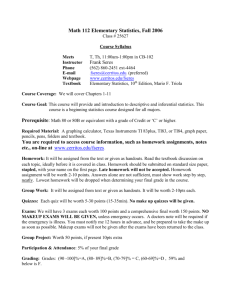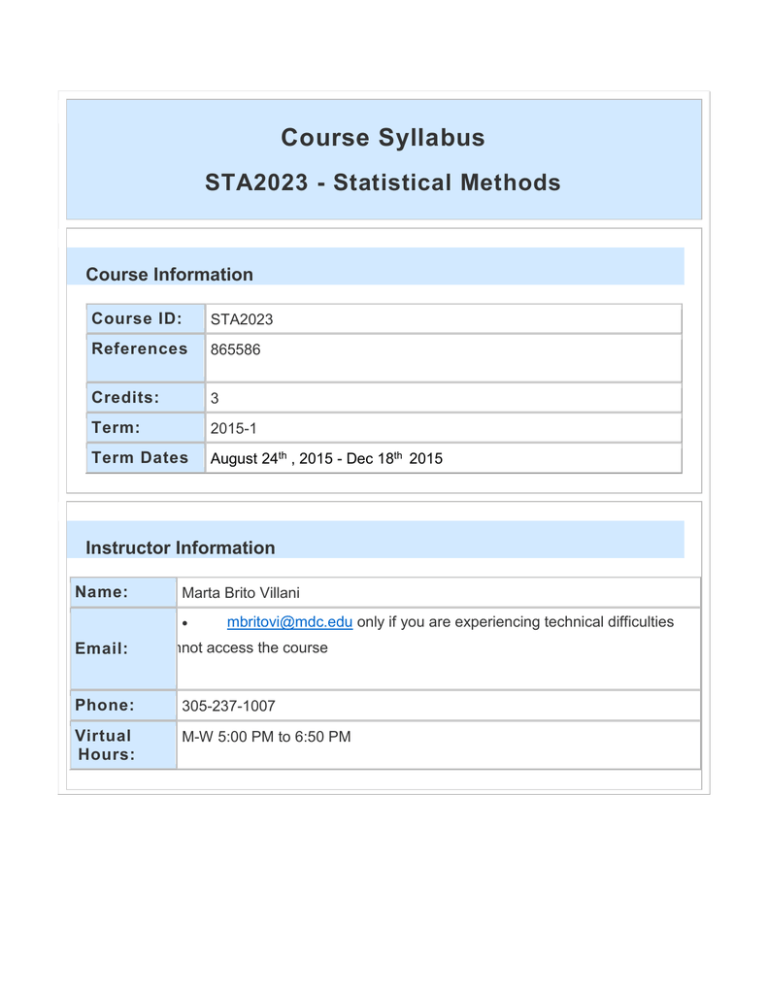
Course Syllabus
STA2023 - Statistical Methods
Course Information
Course ID:
STA2023
References
865586
Credits:
3
Term:
2015-1
Term Dates
August 24th , 2015 - Dec 18th 2015
umbe
Instructor Information
Name:
Marta Brito Villani
mbritovi@mdc.edu only if you are experiencing technical difficulties
Email:and cannot access the course
Phone:
Virtual
Office Hours:
305-237-1007
M-W 5:00 PM to 6:50 PM
Response I check into BB daily on weekdays, so I will get back to you within 24 hours
Policy:on weekdays.
Course Description
To provide the student with a foundation of knowledge in this important area of applied
mathematics.
Prerequisites
MAC 1105 "College Algebra" or suitable placement score
Miami Dade College's Learning Outcomes
This course addresses the following MDC learning outcomes:
Learning
Outcome#1:
Communicate effectively using listening, speaking, reading, and
writing skills.
Learning
Outcome #2:
data.
Learning
Outcome #3:
Solve problems using critical and creative thinking and scientific
reasoning.
Use quantitative analytical skills to evaluate and process numerical
Learning
Outcome #4:
Formulate strategies to locate, evaluate, and apply information.
Learning
Outcome #5:
Use computer and emerging technologies effectively.
Course Competencies
Upon completion of this course, the student will be able to:
Competency 1: The student will be able to demonstrate, basic knowledge of
statistical terms.
Competency 2:
The student will be able to describe, explore and compare data by:
1. Constructing and interpreting frequency tables and graphs such
as bar graphs, pie charts and stem and leaf plots.
2. Computing and interpreting the measures of centrality: the mean,
median, mode and midrange.
3. Computing and interpreting the measures of dispersion: The range,
variance and standard deviation.
Competency 3: Competency 3: The student will be able to apply the measures of
position by:
1. Computing z-scores.
2. Applying the Empirical Rule to the Normal Distribution.
3. Applying the Chebyshev’s Rule to the Non-Normal (or unknown)
Distributions.
Competency 4:
The student will be able to apply the counting principles by:
1. Defining the Fundamental Counting Principle.
2. Computing the possible outcomes of compound events.
3. Computing Combinations and Permutations.
Competency 5: The student will have a working knowledge of basic probability
theory, including being able to:
1. Describe a sample space and an event.
2. Calculate probabilities of simple, compound and conditional events.
Competency 6:
With respect to random variables, the student will be able to:
1. Distinguish between discrete and continuous random variables.
2. Construct a probability distribution for a discrete random variable and be
able to compute its mean and standard deviation.
3. Compute probabilities for random variables having a binomial distribution.
4. Compute probabilities for random variables having a normal distribution.
5. Apply the Central Limit Theorem.
6. Approximate the Binomial Probability using the Normal Distribution
Competency 7:
The student will be able to construct confidence intervals, relative to:
1. A single mean with population standard deviation known and
unknown.
2. A single proportion.
3. The difference between two means.
Competency 8:
The student will be able to apply hypothesis test procedures by:
1. Identifying Type I and Type II errors.
2. Identifying and interpreting p-values.
3. Testing a single mean for large or small samples.
4. Testing the difference between two means.
5. Testing a single proportion.
Competency 9: The student will have a basic understanding of how to deal with
bivariate data, including:
1. Being able to construct and interpret a scatter-plot.
2. Being able to compute and interpret the linear correlation coefficient.
Required Textbook and Materials
You are required to purchase access to MyStatLab. When you purchase access to
MyStatLab, you will be able to access the textbook (Elementary Statistics, 12th edition, Mario
Triola, Pearson/Addison Wesley) online. Purchasing the textbook for this course is optional. If
you want to purchase the textbook, you will need to purchase a new copy which will give your
access to MyStatLab.
ISBN13: 9780321694645 (Access Code to MyStatLab with access to e-text)
Supplemental Textbook and Materials.
Elementary Statistics. 12th edition, Mario Triola, Pearson/Addison Wesley 2014.
ISBN13: 9780321890238 (Text and MyStatLab Access Code)
Note: Purchasing the textbook for this course is optional. If you want to purchase the
textbook, you will need to purchase a new copy which will give your access to
MyLab/Mastering.
If you wish to purchase the textbook alone, the ISBN is 9780321836960. Of course,
you will still have to purchase the access to MyLab/Mastering at
www.pearsonmylabandmastering.com.
Please refer to the Textbook Information page at the Virtual College website for specific
information on the College bookstores and procedures for ordering textbooks online.
Technology Requirements (Hardware/Software)
Please refer to the Blackboard Requirements and Plugin Information at the Virtual
College website. Internet Explorer is the recommended browser and headsets / microphone are
needed for participation in web-conferencing activities through Elluminate; webcam is optional. In
addition, Microsoft Office applications such as Word, Excel and PowerPoint are standard for
Virtual College courses.
Due to the necessity of technology in Virtual College Courses, you must have a backup
plan for using an alternative computer with internet access in case of problems with your personal
computer. If you live in the South Florida area, you may use the computer courtyards located on
MDC campuses. If you have a technology problem that affects your ability to access your online
course, please notify your instructor immediately. If you can access other internet sites but cannot
access your online course, you need to contact the Virtual College Help Desk at 305.237.3800 to
seek assistance.
If you have no internet access at all, it is not a Virtual College / online course issue.
Please be aware that the Virtual College's Help Desk does not cover problems that you may be
experiencing with your computer hardware, installation of software, internet connection, or other
technical problems that may require a technician or intervention from your Internet Service
Provider.
Course Content
The course is organized as follows:.
Module 1:
Introduction to Statistics
Module 2:
Summarizing and Graphing Data
Module 3:
Statistics for Describing, Exploring, and Comparing Data
Module 4:
Probability
Module 5:
Probability Distributions
Module 6:
Normal Probability Distributions
Module 7:
Estimates and Sample Sizes
Module 8:
Hypothesis Testing
Module 9:
Correlation and Regression
Course Work Requirements
To successfully complete this course, you need to spend at least an average of 12 hours
per week on the course, which includes readings, postings, quizzes, exams, etc. Set up a weekly
time schedule that allows you sufficient time to complete the assigned course work by the
required due dates. Plan to check-in and complete assignments at least three times a week. Do
not procrastinate! Turn your work in early or by the due date.
Participation:
Discussions Forums are set up for each module. You are expected
to participate in at least six of these. Your five highest grades will be
counted.
Assignments:
Read the online textbook in MyStatLab, watch the online videos in
MyStatLab, read all modules contained in Blackboard, and complete the
homework assignments in MyStatLab. All assignment sets are to be
completed before taking the corresponding test.
Tests:
Exams:
Practice exams will be available for each unit prior to the graded test.
You can take the practice exams as many times as you wish. The practice
exam does not count toward your overall class grade. The practice exams
are available in MyStatLab, and the actual exams are available in
Blackboard.
The Final is a proctored exam. This final is comprehensive
the final will cover all the material in the course
the final is mostly multiple choice
a sample final test will be available in Blackboard
The proctored final must be completed within the testing window
established by the Virtual College. Please check the course calendar to find
the testing dates for the proctored exam required in this course.
Students currently have three options when taking a proctored
assessment:
1.
MDC Testing Center(s)
2.
Remote Proctors and
3.
Technology Supported Proctoring
Please visit Virtual College Testing Information for very important
information about proctored testing.
Late and Make- No Make-ups are allowed.
Grading.
Grading Criteria
Course
Requirements
Participation (highest five
of six
Discussion Grades will be counted)
Percentage
5%
Assignments
10%
Tests
55%
Proctored Final Exam
30%
Total Points Possible
100%
Miami Dade College's Letter Grades
Range
Letter Grade
90 - 100
A
80 - 89
B
70 - 79
C
65 - 70
D
64 and below
F
Miami Dade College Policies
Students' Rights and Responsibility Handbook
This handbook provides you with the basic information you need to know as a student
at Miami Dade College. Please review the Student's Rights and Responsibilities Handbook to
learn about policies addressing code of conduct, grade appeals, religious observations,
services for students with special needs, and many other areas. Due to the nature of the online
environment, the information below supplements the Handbook for Virtual College students.
Academic Dishonesty
Please carefully review the Academic Dishonesty policies in the Student's Rights and
Responsibilities Handbook.
The Handbook identifies "cheating on an examination" as one of the actions included
under academic dishonesty. In this course, you are expected to complete quizzes and exams
independently and without access to the course's online content or your own study notes.
Having multiple browser windows open, accessing previous quizzes or course readings, and
using your course notes while taking a quiz or exam constitute cheating. All your course activity
is recorded by the ANGEL system; activity logs during the times when you are taking quizzes /
exams that demonstrate access to other course components constitute evidence of cheating,
and may result in a failing grade for the corresponding quiz or exam.
You may have access to content in completed quizzes / exams. Copying,
photographing, or any form of duplicating content in any assessment violates the integrity of the
assessment. Such actions will be viewed as academic dishonesty and may result in a failing
grade for the corresponding quiz or exam.
Plagiarism is another action identified as academic dishonesty in the Handbook.
Presenting the work or ideas of someone else as one's own constitutes plagiarism, which is
why students are always expected to cite their sources. Through the use of Turnitin, unoriginal
work can be easily identified; if not sourced, this constitutes evidence of plagiarism, and may
result in a failing grade for the corresponding assignment.
Course Withdrawal
After registering, students may change their schedules during the drop / add period.
The dates for this period are listed on the Academic Calendar that may be found as a link on
the Miami Dade College homepage.
If you decide to drop this course and you desire a full refund, you must do so before the
last day to withdraw with a full refund (see College Academic Calendar for date). If you stop
logging on to class without officially withdrawing through the Registrar's Office, the instructor
may withdraw you for nonattendance. If you continue to log on but do not participate in the
class and complete assignments, the instructor may withdraw you for inactivity.
All your log on and course activity are recorded by the ANGEL system. The instructor
notifies absent / inactive students of his / her intent to withdraw them via e-mail and / or phone;
if the student does not respond in the amount of time allotted, the instructor may withdraw the
student. Once a student is withdrawn, course access will be denied.
Incomplete Grades
An Incomplete is given only where extenuating circumstances exist, such as
documented medical problems or a death in the family, and is issued solely at the discretion of
the instructor. If the instructor agrees to grant an Incomplete, a written agreement must be
completed between the instructor and the student, specifying the coursework to be completed,
in what manner, and by when. Failure to fulfill the terms of the contract by the end of the next
major term will result in an "F" for the course. A student may not remove an Incomplete by
registering in a subsequent term to re-take the course.
For more information on Incomplete grades, please refer to the Student's Rights and
Responsibilities Handbook.
Hurricane and Other Natural Disasters
In the event of a hurricane or other disaster, the Virtual College follows the schedule
established by the College for campus-based courses. Please visit the MDC website
(http://www.mdc.edu) or call the MDC hotline (305.237.7500) for situation updates.
Assignments and due dates will be adjusted based upon the impact of the storm on our
community. However, if the College reopens and you are still without power or internet access,
it is up to you to have a backup plan (MDC computer courtyards, labs and libraries; Miami-Dade
County public libraries; or similar facilities). Please keep in touch with your instructor if at all
possible.
Miami Dade College - Virtual College - All Rights Reserved

